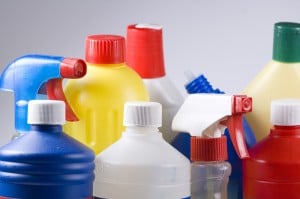?A Pre-Passover Question: Do Cleaning Materials Affect the Heart
A Pre-Passover Question: Do Cleaning Materials Affect the Heart?
Jewish homes everywhere are being scrubbed to get ready for Passover. Cleaning for Passover is great exercise, but it may not be as benign as it sounds.
According to a 2013 report by the Poison Control Center, the week preceding Passover is accompanied by a 22% increase in exposure to various poisons among the general population in Israel. 45% of these incidents occur in children under the age of 6. The vast majority of poisoning cases in children occur at home as a result of contact with various cleansing and exterminating materials, chemicals and medications that are accidentally left within their reach.
The Effect of Cleansers on Our Health
 There is a great deal of discussion in the medical literature about the effects of cleansers on our health. The most recent survey of this material reviewed articles from the years 1976-2012 addressed the effects of cleansers on respiratory illnesses in professional cleaners.
There is a great deal of discussion in the medical literature about the effects of cleansers on our health. The most recent survey of this material reviewed articles from the years 1976-2012 addressed the effects of cleansers on respiratory illnesses in professional cleaners.
Bleach and ammonia-based cleansers, as well as cleansing sprays, were linked to diseases caused by irritation of the respiratory system – allergic rhinitis and asthma. Furthermore, cleaning personnel were found to be at higher risk of asthma than those in other professions, apparently due to the higher concentrations of chemicals in their work environment. The researchers’ recommendations for preventing diseases linked to exposure to cleansing agents included switching to cleansers that are less irritating to the respiratory passageways, and refraining from mixing different cleansing agents (especially bleach).
A further study of 183 cleaners in California hospitals investigated characteristics of the workers and common symptoms they developed after exposure to various cleansing agents. The results were examined from various angles, including based on gender. Female cleaners were found to be at significantly higher risk of developing symptoms than were their male counterparts (45% of women as opposed to 25% of men,) with the most common complaints including breathing difficulties (31%), among them: runny nose (19%), shortness of breath (7%) and wheezing (4%). Less common were complaints of vision disturbances (15%), neurological problems (13%), allergic dermatitis (6%) and digestive complaints (3%).
Cleaning Rate and Heart Rate
- One study investigated how exposure to various cleansers affected heart rate variability (HRV) This measure reflects the intervals between heartbeats, and high heart rate variability is associated with longer life expectancy. Variability is reduced by activation of the sympathetic nervous system, the internal system in charge of the “fight or flight” response. The activation of this system raises adrenaline levels and heart rate, but reduces the variability between beats. Heart rate variability is increased by the parasympathetic nervous system, which is linked to relaxation and lower heart rates.
These two systems are both constantly activated, with fluctuations in the balance between the systems. These fluctuations can be tracked by looking at heart rate and the differences in the intervals between beats. A decrease in heart rate variability indicates a relative rise in the activity of the sympathetic nervous system, which in the long term is linked to increased risk of cardiovascular disease and mortality.
The study of exposure to cleansers followed 581 mostly-female Swiss adults. The researchers asked the subjects to report how frequently they use cleansing agents in their homes, and measured their heart rate variability. The results demonstrated a correlation between increased use of cleansing agents and lower HRV, especially with respect to sprays and scented products.
The results of the study suggest that increased use of cleansers may be associated with higher levels of cardiovascular events in the long-term. It may be that use of household cleansers, especially scented sprays, leads to inhalation of poisonous chemicals that may interact with organic materials in the body, creating new poisonous compounds that may be even more harmful than the original substances. These may provoke inflammation of the respiratory passageways and elicit inflammatory processes elsewhere in the body. Inflammation is a major trigger of atherosclerosis.
So, when you clean for Passover, make sure that you read the instructions, don’t inhale and don’t mix cleansers.
We wish you a happy, clean and safe Passover!
Author: Yaakov (Kobi) Magreli is a graduate of The Hebrew University Hadassah Medical School and a graduate student of public health on an MD/MPH track.
Search
Recent Posts
Abuse and Heart Disease
Abuse and Heart Disease: Exposure to trauma and...The Fake News Fiasco
We are exposed to a tremendous amount of inform...Coaching For Change
The Pollin Center’s health coaching group is an...When on-line is off limits: Innovative Corona-tailored health promotion program for Ultra-orthodox women – Chevruta L’Chaim
Ultra-Orthodox (Haredi) women have worse health...21444
The stress, apprehension and the fears coupled ...
